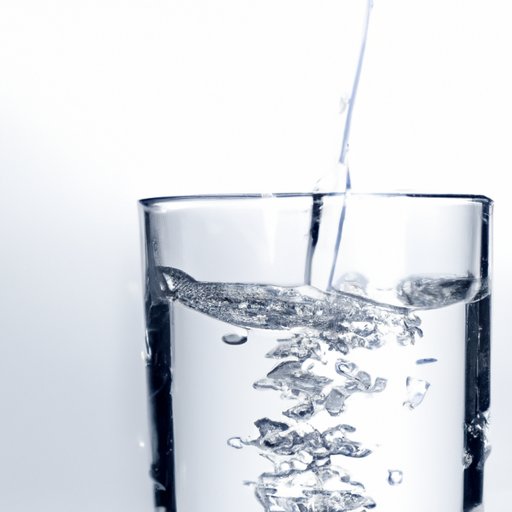
Introduction
Water is essential for our body to function properly. About 60% of our body is composed of water, which plays a crucial role in regulating body temperature, protecting organs, and aiding in digestion. However, many people still wonder how much water they should drink each day.
Although the popular recommendation is to drink 8 glasses of water per day (64 ounces), it’s not a one-size-fits-all approach. The actual amount of water needed varies depending on several factors, such as age, weight, and gender. In this article, we’ll explore the science behind daily water intake recommendations, how to calculate your specific water needs, the health benefits of drinking enough water, and signs of dehydration to look out for.
The Science behind Daily Water Intake Recommendations
The amount of water each person needs daily depends on several factors, such as age, weight, gender, and physical activity level. The human body loses water throughout the day through sweating, urinating, breathing, and bowel movements. Therefore, it’s crucial to replace it by drinking enough water.
According to the Institute of Medicine, an adequate daily intake of water for men is around 3.7 liters (about 125 ounces), and for women, it’s around 2.7 liters (about 91 ounces). However, this amount varies depending on these factors:
- Pregnancy and breastfeeding: pregnant women need more water to support the fetus and produce more amniotic fluid. Breastfeeding women need to drink more water to produce enough milk.
- Age: older adults tend to have a lower volume of body water and may need to drink more water.
- Weight: a larger person may need to drink more water to meet their body’s needs.
- Climate: people living in hot and humid climates lose more water through sweating and need to drink more water.
How to Calculate Your Specific Water Needs
To calculate your specific water needs, there are a few formulas you can use that take into account your weight and physical activity level:
- The most straightforward method is to drink half of your body weight in ounces. For example, if you weigh 150 pounds, you would need to drink 75 ounces of water per day.
- A more precise formula is to multiply your body weight by 0.67 (for men) or 0.6 (for women) to determine your daily water intake in ounces.
- If you’re physically active, you’ll need to drink more water. A general rule of thumb is to add another 12-16 ounces of water for every 30 minutes of exercise.
It’s essential to adjust your water intake based on your specific needs. Listen to your body and drink more water if you feel thirsty or notice the signs of dehydration.
Health Benefits of Drinking Enough Water
Staying hydrated has numerous health benefits, including:
- Improving digestion: water aids in digestion, helping to break down food and absorb nutrients. Dehydration can cause constipation and other digestive issues.
- Clearing skin: drinking enough water can help to flush out toxins and promote clearer skin.
- Boosting energy: dehydration can cause fatigue and negatively impact physical and mental performance.
- Regulating body temperature: water helps to regulate body temperature, preventing overheating and heat exhaustion.
- Promoting weight loss: drinking water before meals can help to reduce appetite and promote weight loss.
Several studies support these claims. For example, a study published in the Journal of Human Nutrition and Dietetics found that drinking more water is associated with less sugar, sodium, and saturated fat consumption, which can result in lower body weight and body fat percentages.
Signs of Dehydration to Look Out For
Dehydration can have a range of negative effects on the body, including:
- Headaches
- Dizziness or lightheadedness
- Dry mouth and throat
- Dark urine
- Feeling tired or lethargic
- Dry skin
- Constipation
In severe cases, dehydration can lead to heat exhaustion, heatstroke, and even death. It’s essential to stay hydrated by drinking enough water throughout the day.
Conclusion
Drinking enough water each day is crucial for our body’s proper functioning. The amount of water each person needs daily varies depending on their age, weight, gender, and physical activity levels. By following the guidelines in this article, you can calculate your specific water intake needs and stay hydrated.
Make sure to stay aware of the signs of dehydration and drink enough water to prevent any negative effects on your body. It’s a small change to make in your daily routine that can have profound effects on your overall health and wellbeing.





